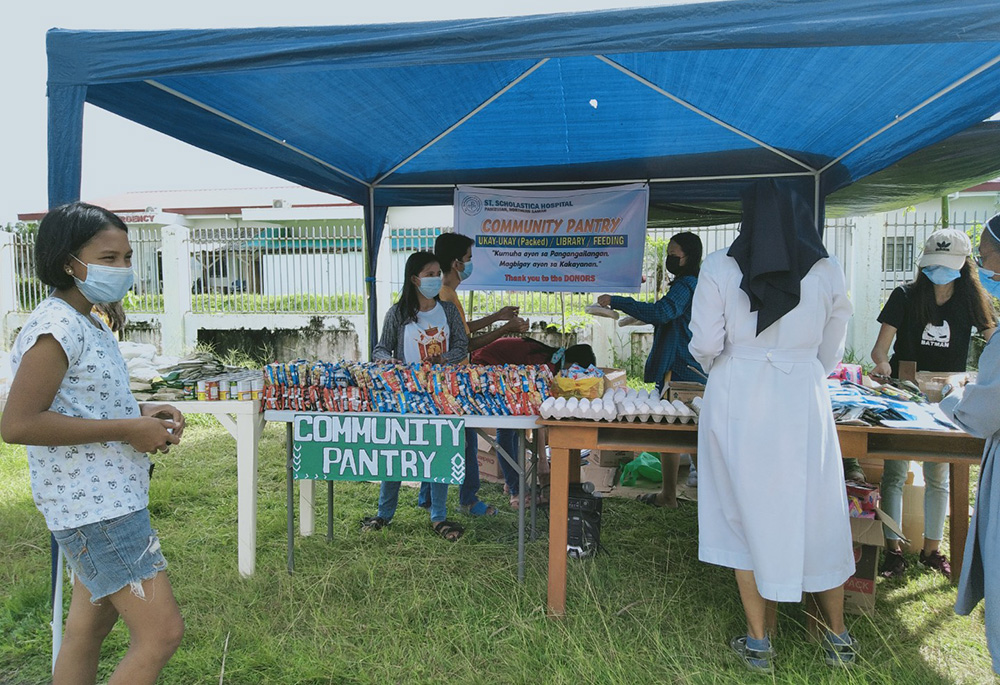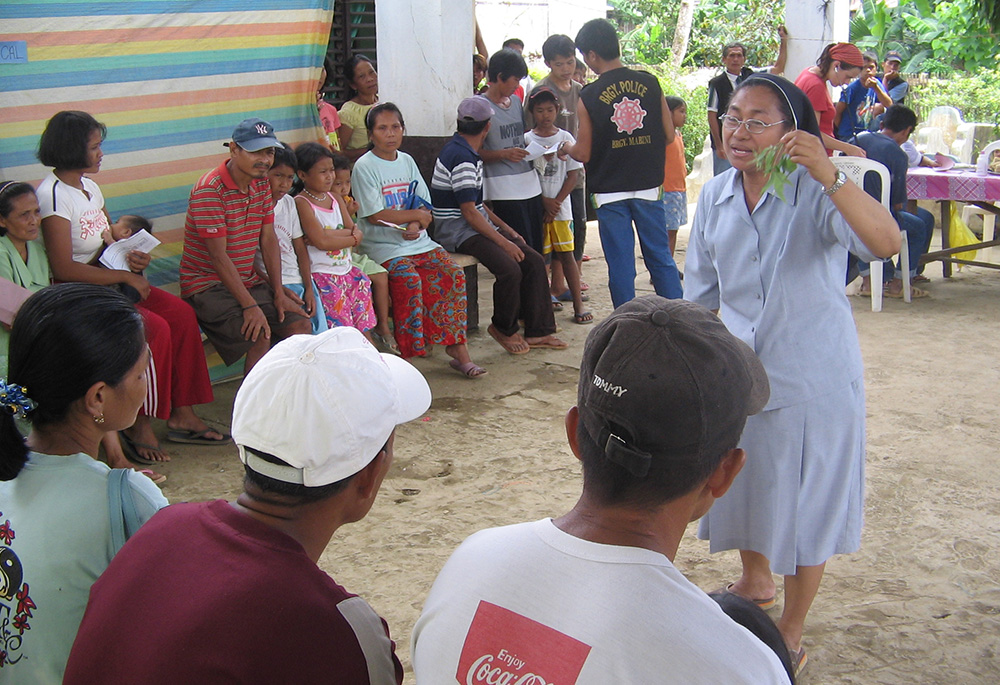
The Socio-Pastoral Apostolate implements the missionary endeavors of the Manila Priory, the religious house of the Missionary Benedictine Sisters in the Philippines. SPA sisters serve those on the margins, with efforts like the community pantry pictured above. (Courtesy of Edita Espolor)
I have read many articles that say walking has powerful benefits. As an exercise, it may lower our risk of high blood pressure, heart disease, and diabetes. It can strengthen our bones and muscles. It may help us maintain a healthy weight and it can make us strong.
In the same way (in missionary parlance) walking towards the periphery is a healthy boost to our recollection and missionary endeavors. Who are in the periphery? They are the people living on the margins of our society — they include those living in poverty, the "lost sheep," the abandoned, farmers, fisherfolks, the urban poor, Indigenous people, and others.
The Socio-Pastoral Apostolate, or SPA, is one of the implementing arms of the missionary endeavors of the Manila Priory (religious house of the Missionary Benedictine Sisters in the Philippines). The sisters are assigned to the social apostolate in the outreach centers of our schools and hospitals. Those sisters took to heart the fiat they prayed in response to the exhortation from Micah 6:8: "And what does the Lord require of you? To act justly and to love mercy and to walk humbly with your God." And so they walked, they talked, and they walked their talk on the periphery.
Looking beyond the gaunt faces of the retired Socio-Pastoral Apostolate sisters, their misshapen bodies, dark-lined foreheads, arthritic hands and knees, their deafness and blindness, we can see the many long years of untiring walking back and forth towards the periphery. They did not mind the dangers, the heat, the backbreaking burdens. What is commendable in these stalwarts are their many years of sheer persistence and hard work — without counting the cost, unswerving in their vision and mission to the people living in poverty.
They were responsible for animating the Socio-Pastoral Apostolate through the years, giving birth to "Enabler Centers" in the provinces and connecting to relevant and down-to-earth organizations. They are not perfect, but they are beautiful and mystifying if we look at them with the eyes of faith and see how God used them to bring good news to the poor, using their feet (Isaiah 52:7) and their whole being. They are the pillars of the Socio-Pastoral Apostolate.
What motivates the Socio-Pastoral Apostolate sisters to walk towards the periphery? SPA discerns the pulse of the time by consistently listening to the cry of the poor, ensuring that the message is being understood correctly and that the response is appropriate to the needs and situation of people living in poverty and oppression, and those who are marginalized.
Advertisement
In so doing, the Socio-Pastoral Apostolate sisters become endeared to folks in need as their healing presence graces and inspires a number of committed staff and volunteers — professionals, youth, women and church workers — who adhere to the vision and mission of SPA. They are the sisters' terra firma.
As always, with their mission to reach out to the unreachable brothers and sisters in the hinterlands, the Socio-Pastoral Apostolate sisters, lay partners and partner advocates are sometimes branded as communists. It reminds me of Archbishop Dom Hélder Câmara's quote: "When I fed the poor, they called me a saint. When I asked 'Why are they poor?' they called me a communist."

Sr. Edita Eslopor leads training in herbal medicine. (Courtesy of Edita Espolor)
The reason is simple: They go beyond the plain duty of feeding, healing and educating from their safe and familiar circumstances, and venture to far-flung barrios with other progressive advocates, seriously looking into people's pitiable situations.
As a consequence, abundant "toxins" have plagued the Socio-Pastoral Apostolate and its partner organizations for decades. From experience, I can say that the perennial toxins are militarization, tyrannical harassment, death threats, ecological destruction, red-tagging, and the like!
What antidote did the sisters and lay mission partners inject to counter these toxins? The antidotes the SPA espoused through the years:
- Community organizing, trusting in the capacity of the people in poverty to help and organize themselves;
- Establishing strong ties with cause-oriented groups and other progressive groups, and "injecting" the adrenaline of struggle for a meaningful social transformation;
- Getting media coverage outside the Philippines about the state's crimes against human rights, women and ecology;
- Providing relevant and truthful education and values/spiritual formation, with a powerful dose of Jesus and St. Benedict's truths and teachings.
The People's Organization and the people living in poverty are the stronghold of the Socio-Pastoral Apostolate, for without them, the SPA's reason for existence is irrelevant and strained. The unwavering support for the Socio-Pastoral Apostolate and the cherishing of the missioners by the leaders in our Priory is notable. And so, the Socio-Pastoral Apostolate assemblies through the years — conducting evaluations, sharing, listening, updating, planning — ought to ensure that it is going in the right direction, not vacillating in its response to the cry of the people living in poverty and the congregation's charism.
We agree with the wisdom commonly attributed to an African proverb: "If you want to go fast, go alone. If you want to go far, go together."
And the Socio-Pastoral Apostolate sisters are especially inspired and guided by the exhortation of Pope Francis: "From this point of view, we need a Church capable of walking at people’s side, of doing more than simply listening to them; a church which accompanies them on their journey."
Now more than ever, we stand facing the formidable hydra-headed monsters of the powers that be, especially with the return to power of the family of the dictator Marcos. Our sisters will be tested at the core of their missionary commitment.
We have to fortify their ranks, consolidate our God-given resources with the people of God on the periphery. As we walk in the will of God, we will see God's blessings. St. Francis of Assisi said it all: "It is no use walking anywhere to preach unless our walking is our preaching."







